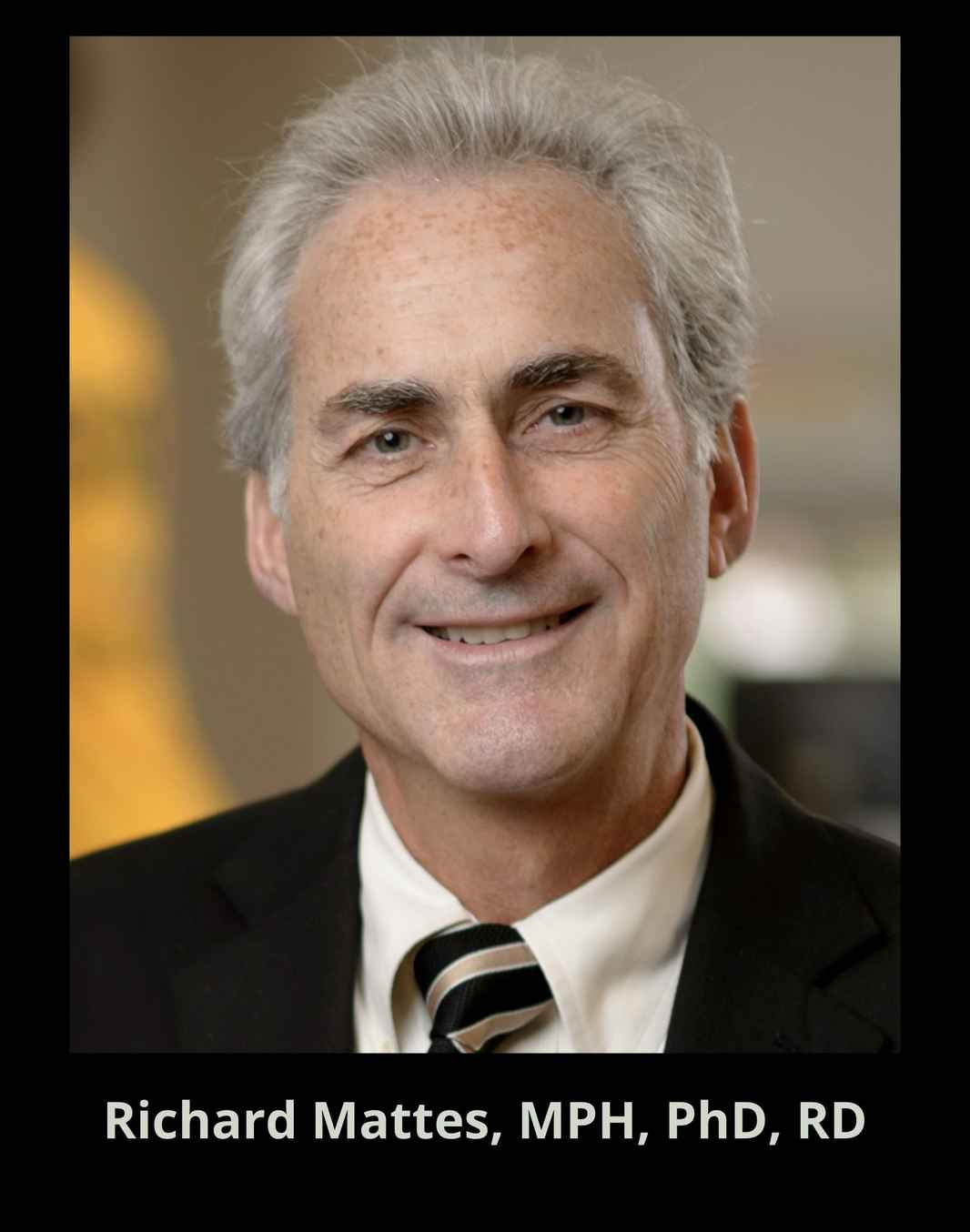Low Calorie Sweeteners
Q&A for Session #8
Low Calorie Sweeteners' Impact on Weight and Hunger
Sports Nutrition Symposium 4.0
Thursday January 20th, 2022 @ 7 pm CST
Low Calorie Sweeteners' Impact on Weight and Hunger
Richard Mattes, MPH, PhD, RD
This presentation will critically examine the effects of low calorie sweeteners on appetitive sensations, energy intake and body weight. Emphasis will be placed on the variability of responses to different sweeteners.
Replay of this session and others sessions can be obtained with a VIP Pass
VIP Pass
- I missed the number of kcals needed to meet RDA guidelines, did you say that was 710kcal?
- No, if one requires 2000 kcal to maintain body weight, then one needs to consume a certain amount of energy to meet their nutrient needs. 288 kcal are available for discretionary use- to choose something with high sugar or high fat content. If you consume more, then you will be in positive energy balance. So no more than 5-6% of energy from added sugars should be consumed.
- No, if one requires 2000 kcal to maintain body weight, then one needs to consume a certain amount of energy to meet their nutrient needs. 288 kcal are available for discretionary use- to choose something with high sugar or high fat content. If you consume more, then you will be in positive energy balance. So no more than 5-6% of energy from added sugars should be consumed.
- Are there any side effects from too much aspartame consumption?
- Too much is too much. Individuals can react to any given chemical in any given way. One can never exclude the possibility. However, aspartame, if one was going to design a chemical, cannot get much safer. It is two amino acids. You have to put on your filter, and the science does not support the conclusion that it's correlated with cancer.
- Too much is too much. Individuals can react to any given chemical in any given way. One can never exclude the possibility. However, aspartame, if one was going to design a chemical, cannot get much safer. It is two amino acids. You have to put on your filter, and the science does not support the conclusion that it's correlated with cancer.
- Is there any evidence that overconsumption of artificial sweeteners may cause metabolic syndrome pathologies?
- No, I can say that quite unequivocally. They have done research on a repetitive basis on this subject. Uniformly agree, these do not lead to cancer, metabolic abnormalities. If you consume any nutrient more than 10x the RDA, it is a drug, and the effects will not be what we anticipate as a nutrient.
- No, I can say that quite unequivocally. They have done research on a repetitive basis on this subject. Uniformly agree, these do not lead to cancer, metabolic abnormalities. If you consume any nutrient more than 10x the RDA, it is a drug, and the effects will not be what we anticipate as a nutrient.
- Is it possible that the RCT's showing substitution of NS for LCS showed significant reduction in body weight, fat mass, and waist circumstances due to confounding variables, such as participants knowledge of the study, etc?
- The quality of the individual studies differs and bias is always a concern in a study, but in my own view and reading the originals, bias is reasonably well controlled so I do not think that is the explanation.
- The quality of the individual studies differs and bias is always a concern in a study, but in my own view and reading the originals, bias is reasonably well controlled so I do not think that is the explanation.
- Do NNS’s (non nutritive sweeteners) actually not have kcals, or do we just not have the enzymes to break them down to extract the kcals? If so, do we actually absorb them into our bloodstream or do they pass through our GI tract undigested like an insoluble fiber would?
- Depends on the sweetener. For example, aspartame is two amino acids which are metabolizable. Aspartame takes such a small amount to elicit a strong sweet sensation that we consme only a trivial amount. There are others that are not absorbed, so we get no energy from them or are non-caloric.
- Depends on the sweetener. For example, aspartame is two amino acids which are metabolizable. Aspartame takes such a small amount to elicit a strong sweet sensation that we consme only a trivial amount. There are others that are not absorbed, so we get no energy from them or are non-caloric.
- Does the body react to monk fruit the same as the other lcs? Also do you have any info on how the body reacts to coconut sugar? Does the body treat it like glucose?
- Great question. That science has not been done to my knowledge. There are a number of alternative sweetners that are gaining in popularity and we just do not have the science to come to conclusions yet. They are different chemicals and the assumption going in should be that they may elicit a different response. We have to have an open mind.
- Great question. That science has not been done to my knowledge. There are a number of alternative sweetners that are gaining in popularity and we just do not have the science to come to conclusions yet. They are different chemicals and the assumption going in should be that they may elicit a different response. We have to have an open mind.
- Is there a drink with a certain LCS (low calorie sugar) that you would recommend for hydration and athletes?
- No, I am not an expert in hydration. I would be surprised if any of the low calorie sweenteners had a different effect. I do not know the science there and I could be wrong. The nutritive sweeteners can have different effects from the low calorie sweeteners, among the low calorie sweeteners I do not know the evidence that would suggest that one is preferable over another.
- No, I am not an expert in hydration. I would be surprised if any of the low calorie sweenteners had a different effect. I do not know the science there and I could be wrong. The nutritive sweeteners can have different effects from the low calorie sweeteners, among the low calorie sweeteners I do not know the evidence that would suggest that one is preferable over another.
- Can low calorie sweeteners be taken for longer periods without any effect on health?
- Until we have done studies for a life time, we do not know. Saccharine has been around since the last 1800s so we have a lot of experience with it. No evidence that saccharine consumption for long periods has adverse health consequences.
- Until we have done studies for a life time, we do not know. Saccharine has been around since the last 1800s so we have a lot of experience with it. No evidence that saccharine consumption for long periods has adverse health consequences.
- Because it takes a lesser concentration with LCS and evaluations done are on acceptable ranges for safety, would it be fair to say that the levels added in products could be dangerous to health? Especially if someone is using many of the products daily?
- No, exactly the opposite. The food manufacturers are well aware of the RDA and upper limits for safety. They are sure that their products to not exceed that level.
- No, exactly the opposite. The food manufacturers are well aware of the RDA and upper limits for safety. They are sure that their products to not exceed that level.
- In many studies, sweeteners were compared to a control group. Did it make a difference if the participants knew they were ingesting a sweeteners or not?
- That's one of the things near impossible to control. The only way to do a blind study like this is putting in a capsule and swallowing it. That does not mimic the response if we consumed it. If we put something in our mouth it stimulates a release of insulin. It's an anticipatory reflex that allows the body to anticipate the likely metabolic consequences from the food and allows us to adjust. If you ate carbohydrates but you didn't know how much was coming in and your body put out too much insulin, hypoglycemia occurs. We have this sense of taste that gives us forshadowing. So if you put it in a capsule, you take out the regulatory effect.



Facebook comments